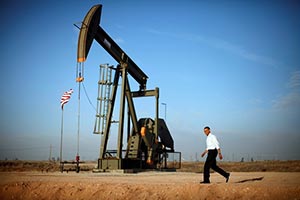Senior Reporter
Obama's $98.1 Billion Budget Proposes New Per-Barrel Fee on Oil

Specifically, the Obama administration has proposed that oil companies pay a $10.25-per-barrel fee on oil as a way to fund resilient transportation projects. In a fact sheet about the budget, the administration explained the infrastructure programs would aim to reduce people’s work commutes and time stuck in traffic for truckers and motorists.
The proposal, billed as the 21st Century Clean Transportation Plan, also is meant to cut back on the country’s reliance on oil, as well as invest in clean energy technologies.
President Obama said the plan would “help to put hundreds of thousands of Americans to work modernizing our infrastructure to ease congestion and make it easier for businesses to bring goods to market through new technologies such as autonomous vehicles and high-speed rail, funded through a fee paid by oil companies.”
“Meeting future challenges will require a long-term vision for the transportation sector that includes more and cleaner options, and expands those options to communities across the country,” added Transportation Secretary Anthony Foxx. “This budget brings us closer to that vision.”
Overall, the administration is requesting $98.1 billion in budget authority for DOT programs in fiscal 2017. That would include $640 million for motor carrier safety and consumer enforcement efforts through FMCSA.
The budget request connects the administration’s climate change initiative with the type of investments lawmakers wanted in a five-year surface transportation bill enacted in December.
The budget also calls for $3.9 billion over 10 years for large-scale deployment pilots to develop a common network for connected and autonomous vehicles, $1.25 billion a year for the DOT’s Transportation Investment Generating Economic Recovery, or TIGER, grant program,about $730 million for the National Highway Traffic Safety Administration to research and develop new life-saving technologies, $295 million for the Pipelines and Hazardous Materials Safety Administration, and $3 million to promote public-private partnerships efforts.
The administration also has proposed using one-time revenue from a corporate tax overhaul, which it claims would raise nearly $200 billion for transportation programs.
But Obama’s plan has little chance of being enacted. Republican leaders who control the House and Senate expressed no interest in adopting the administration’s investment proposals for infrastructure projects.
House Speaker Paul Ryan (R-Wis.) said the proposal was “dead on arrival” in his chamber. In the Senate, Oklahoma Republican James Inhofe, chairman of the highway panel, blasted the administration’s plan.
“The president’s last budget is nothing new,” Inhofe said. “Congress will instead move forward on crafting a serious budget that represents the interests of the American people.”
Speaking to Transport Topics, Jack Basso, an analyst with global business consulting firm Parsons Brinckerhoff, said it was unlikely the president’s new oil fee will advance.
“I don’t see the Republicans in Congress enacting any of that, and if you don’t have that, then I don’t know where the revenue comes from to do what they want to do,” Basso said. He added that the overseas profits proposal also has little chance of being adopted.
“I think the chances of that, particularly as we lead up to the elections, are not good at all, but nonetheless give them an ‘A’ for effort for trying,” Basso said.




